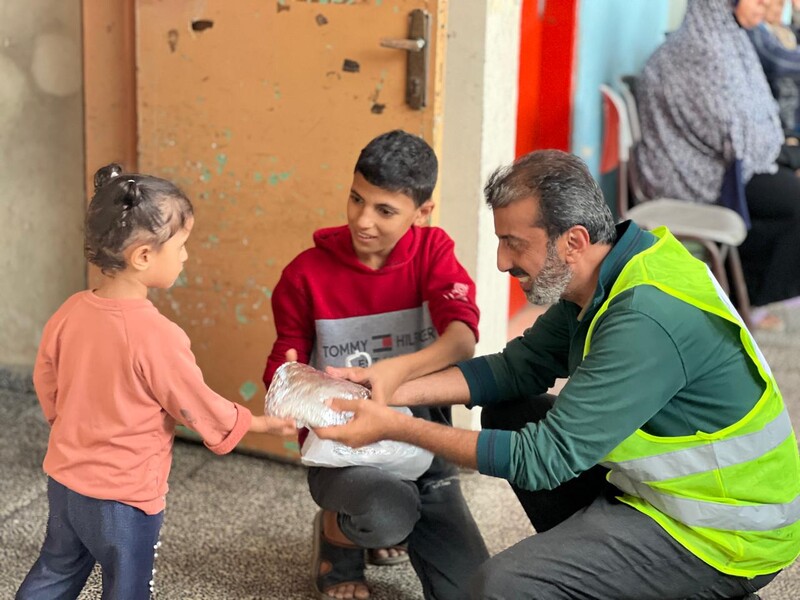The Electronic Intifada 20 June 2024

Firas Ramlawi gives food aid to displaced children in Gaza. (American Friends Services Committee)
Firas Ramlawi is trying to provide aid under the most difficult circumstances imaginable.
A manager with the American Friends Services Committee (AFSC), Ramlawi was forced to flee his own home in northern Gaza during the current war and has moved several times since then. His mother has been unwell for months.
With very few staff and volunteers, the AFSC has been providing a range of services. They include offering food aid to families, hygiene kits to women and arranging kite flying and other recreational activities for children and adolescents.
AFSC’s aid work is accompanied by its international campaigning. One of its projects is called Goals for Gaza.
By joining forces with football players across the world, that project demands an end to US military support for Gaza and the lifting of restrictions on humanitarian aid.
Ramlawi admits that he and his colleagues cannot cope with the “constant danger and fear under Israeli bombardment.”
“Most of the time, we can’t deliver aid to all the people who are being targeted,” he said.
“Displacement is another reason why we’re unable to be consistent. And displacement is very frequent as Israel is always expanding its military operations.”
The scarcity of food and other essentials in Gaza’s markets causes enormous problems for aid workers. So do the poor phone and internet connections and the lack of transportation.
“At the same time, we have bought tons of food [from outside] but can’t bring them into Gaza,” Ramlawi said. “Our convoys are stopped at the border, which is a massive challenge for us.”
“The crossings must reopen to let goods flow in and our work resume,” he added.
Even more fundamentally, the AFSC is insisting on an immediate ceasefire. “We are calling on the whole world to protest against the genocide in Gaza and to stop it,” Ramlawi said.
The International Agency for Aid, Relief and Assistance (INARA) is striving to provide Gaza’s people with food aid and medicine and solar panels for displacement camps. It is also trying to treat trauma in children, many of whom have lost family members.
“We mostly concentrate on involving them [traumatized children] in various activities, including playing football and singing,” said Abdulrahman Ismail, an INARA representative.
The closure of Gaza’s crossings presents INARA with its biggest challenge. Vast numbers of children cannot receive the medicine they need.
“Nothing is allowed to enter, which makes it hard to deal with the traumatized,” Ismail said. “We are even afraid they will die as a result.”
Aid workers in Gaza are themselves traumatized and exhausted.
“It’s painful when it’s out of our hands,” Ismail said. “We simply can’t deal with this trauma any more.”
Abubaker Abed is a journalist and translator from Deir al-Balah refugee camp in Gaza.





